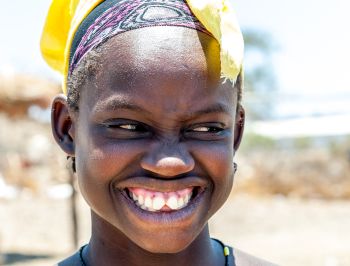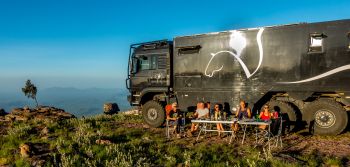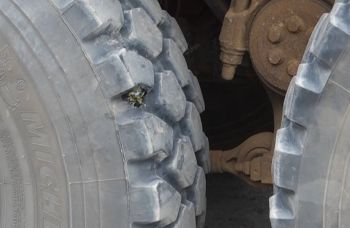13.12.17 – 9.1.18
Encounters

From Virei we wanted to go to Caraculo. The earth track is outlined on all our paper and electronic maps and even signposted on-site with new signposts. Nevertheless, the trail ends after about 35km at a tiny village; then there is only bush. At least we could visit the village together with the local women and girls and “talk” to them a little bit. The men didn’t bother speaking with us, they immediately disappeared somewhere. The people here live very isolated from civilization in wooden and mud huts. They have to carry water from far away. Chickens and goats live also in the village. As a symbol of beauty, people abrade a triangle between the upper blades of their teeth and break out their lower front teeth. They have told me that this is completely painless and generously offered me immediately to break out my teeth and grind them nicely as well. Unfortunately, due to time constraints, I was not able to accept their kind offer.
Along the cliffs of one of the coves the fishing village “Santa Maria” is located. We spent the New Year on the high plateau with a sensational view. We were a little disappointed though that the fishermen did not fire a single New Year’s rocket. Of course, we also visited the village one day. It is divided into two bays. In one bay only a few young men live and in the other bay is the main fishing village. There is a connection between the two bays at low tide along the sea. We used this path to discover that it is also used as the central toilet. Smelling the unpleasant fumes, we wondered if this has any meaning, more or less as an additional foreclosure of the two bays. In the main village we were immediately led to Soba, the village chief. He has told us that the adults fish here and all school-age children go to school in Benguela. The village owns a house for the children there. All fish are also sold in Benguela. For us it was a day trip – for them it might take longer. Water is delivered twice a week at an intersection about two hours walk away. Most of the houses of the village consist of tents, which are usually stiched together from old clothes. Currently about 230 people are living here. We were allowed to look around the village and all the people we met were very friendly, it was a good feeling to be here. Of course, we will never know whether they will build tents from the clothes we gave them or use them as clothes.
The police – your friend and helper
Before Condo we found a super nice place to stay. In the middle of cooking the dinner we were visited by a police patrol. A civilian told us that the police chief present had stated that this place was too dangerous and that we needed to stay in a condo at the police station. We explained to him that the most dangerous places in the world are always in a bigger town or village, but not in nature. It did not help, he forced us to follow him to the city. Right next to a huge generator and in the middle of the usual noise of a city with loads of street lights, we should stay overnight! The civilian wanted our identity papers. We gave him our identity cards. He also wanted our passports. I was not ready to give them to him as he not even wanted to return our IDs. The discussion dragged on until about midnight. We couldn’t imagine why this whole action had happened and what for. However, we did not feel safe anymore with the police.
In Benguela we wanted to change money on the street market and refuel diesel. For the exchange, we looked for the Mercado municipal. We parked in a small side street to figure out how it works. Immediately, a police patrol appeared. We asked for the market and he immediately offered to drive with us and to find a suitable parking space for us. He asked what else we needed and we told him that we still needed diesel, but most petrol stations had none. He told us to wait for him, he would clarify that. In the meantime, we managed to find a money trader who appeared at exactly the same time as the police officer. It made us a little uncomfortable. But no problem, the policeman helped with the calculation and the counting of the money and overlooked sort of the trade! After completing this business, the policeman escorted us across the city to a temporary gas station with diesel. Enormous. We doubt whether our police in Switzerland offer tourists as much help as we received here in Angola.
Overlander
 In Tundavala, one of Angola’s breathtaking viewpoints, we had an appointment with Gloria & Renato. We were there first, enjoyed the view and were scouting the best spot. As we ready and sat comfortably in front of our Globi, enjoying nature and our lunch, suddenly a Swiss German speaking couple appeared: Ruth & Walter. Well-traveled Central Swiss with whom we started talking and got immediately into a lively conversation. Gloria and Renato arrived, got settled in and Ruth and Walter decided to stay here with us as well. The six of us spent a couple of great days with a lot of expert discussions and a valuable exchange of information. Time flew by, it were beautiful days – six Swiss in Tundavala.
In Tundavala, one of Angola’s breathtaking viewpoints, we had an appointment with Gloria & Renato. We were there first, enjoyed the view and were scouting the best spot. As we ready and sat comfortably in front of our Globi, enjoying nature and our lunch, suddenly a Swiss German speaking couple appeared: Ruth & Walter. Well-traveled Central Swiss with whom we started talking and got immediately into a lively conversation. Gloria and Renato arrived, got settled in and Ruth and Walter decided to stay here with us as well. The six of us spent a couple of great days with a lot of expert discussions and a valuable exchange of information. Time flew by, it were beautiful days – six Swiss in Tundavala.
Tire repair – the Angolian way

Once again we caught a screw that wanted to nest in our new tire. With pumping air, however, we reached the next gas station without getting a complete flat tire. The repair could be done right behind the gas station. The method was unorthodox for us. The wheel did not have to be lifted or dismounted. The screw was removed, the leakage cleaned, old rubber sleeves were cut and mixed with glue. That was pushed into the hole with a kind of crochet hook. Then put another portion of glue on it, cut off the excess rubber threads, pump it and that was it. We somehow could not believe it. That was the fastest tire repair ever. To this day, after several thousand kilometers and different road conditions, it has lasted perfectly!






Leave A Comment